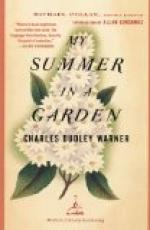The suggestion ripened into execution. Men and women read, and wanted more. These garden letters began to blossom every week; and many hands were glad to gather pleasure from them. A sign it was of wisdom. In our feverish days it is a sign of health or of convalescence that men love gentle pleasure, and enjoyments that do not rush or roar, but distill as the dew.
The love of rural life, the habit of finding enjoyment in familiar things, that susceptibility to Nature which keeps the nerve gently thrilled in her homliest nooks and by her commonest sounds, is worth a thousand fortunes of money, or its equivalents.
Every book which interprets the secret lore of fields and gardens, every essay that brings men nearer to the understanding of the mysteries which every tree whispers, every brook murmurs, every weed, even, hints, is a contribution to the wealth and the happiness of our kind. And if the lines of the writer shall be traced in quaint characters, and be filled with a grave humor, or break out at times into merriment, all this will be no presumption against their wisdom or his goodness. Is the oak less strong and tough because the mosses and weather-stains stick in all manner of grotesque sketches along its bark? Now, truly, one may not learn from this little book either divinity or horticulture; but if he gets a pure happiness, and a tendency to repeat the happiness from the simple stores of Nature, he will gain from our friend’s garden what Adam lost in his, and what neither philosophy nor divinity has always been able to restore.
Wherefore, thanking you for listening to a former letter, which begged you to consider whether these curious and ingenious papers, that go winding about like a half-trodden path between the garden and the field, might not be given in book-form to your million readers, I remain, yours to command in everything but the writing of an Introduction,
Henry Ward Beecher.
BY WAY OF DEDICATION
My dear Polly,—When a few of these papers had appeared in “The Courant,” I was encouraged to continue them by hearing that they had at least one reader who read them with the serious mind from which alone profit is to be expected. It was a maiden lady, who, I am sure, was no more to blame for her singleness than for her age; and she looked to these honest sketches of experience for that aid which the professional agricultural papers could not give in the management of the little bit of garden which she called her own. She may have been my only disciple; and I confess that the thought of her yielding a simple faith to what a gainsaying world may have regarded with levity has contributed much to give an increased practical turn to my reports of what I know about gardening. The thought that I had misled a lady, whose age is not her only singularity, who looked to me for advice which should be not at all the fanciful product of the Garden of Gull, would give me great pain. I trust that her autumn is a peaceful one, and undisturbed by either the humorous or the satirical side of Nature.




